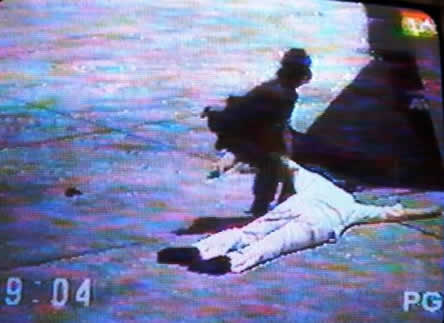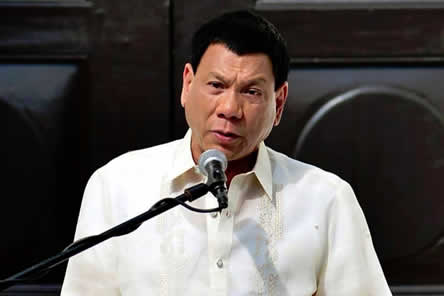|

Ninoy Aquino's lifeless body lying on the airport tarmac.
Photo: wikipedia.org
 o
back in time to August 21, 1983. Back to what was then called the Manila
International Airport. China Airlines Flight 811 from Taipei, sat on the
tarmac awaiting instructions from the tower so its passengers could
disembark. On board was former Senator Benigno Aquino Jr., who had taken
a circuitous route back home from the United States. Aquino knew that
returning to the Philippines, then ruled by a tyrannical dictator was an
extremely dangerous endeavor. Sensing the risks, he wore a bulletproof
vest and told the members of the press on the plane with him to "be
ready with your camera because this action can become very fast… in a
matter of 3 or 4 minutes, it could be all over… and I may not be able to
talk to you again after this…" o
back in time to August 21, 1983. Back to what was then called the Manila
International Airport. China Airlines Flight 811 from Taipei, sat on the
tarmac awaiting instructions from the tower so its passengers could
disembark. On board was former Senator Benigno Aquino Jr., who had taken
a circuitous route back home from the United States. Aquino knew that
returning to the Philippines, then ruled by a tyrannical dictator was an
extremely dangerous endeavor. Sensing the risks, he wore a bulletproof
vest and told the members of the press on the plane with him to "be
ready with your camera because this action can become very fast… in a
matter of 3 or 4 minutes, it could be all over… and I may not be able to
talk to you again after this…"
Aquino was then
escorted off the plane by a contingent of Philippine military personnel
and even before he could set foot on Philippine soil, he was dead.
Who ordered his
assassination? Thanks to the lying and secretive Martial Law regime of
Ferdinand Marcos, the ineptness of Philippine investigators, and the
absence of resolve from subsequent administrations, the mastermind has
never been unmasked.
For purposes of this
editorial it immaterial who ordered Aquino's assassination. As his
widow, former President Corazon Aquino put it, Marcos was ultimately to
blame for Aquino's death. Marcos set the stage and fostered the
atmosphere where the elimination (or "salvaging") of his enemies was the
accepted thing for his people to do. There was no need for an explicit
order. Loyal Marcos allies knew Aquino was a threat to Marcos, and
ultimately a threat to them as well. So someone, somewhere simply took
the initiative and had Aquino killed.
Fast forward to today
and the possibility of a Rodrigo Duterte presidency. Over the years
Duterte has built a reputation as the tough-talking, get-things-done
mayor of Davao City. His detractors claim he cleaned out the city of
drug pushers and drug dealers by resorting to extra-judicial means.
Pushers, some still in their teens were found dead—the handiwork of
vigilante groups operating in Davao that Duterte admitted having ties
to.
Since his bid for the
presidency, Duterte appears to have distanced himself from any
connection with vigilante groups. But "old habits die hard" and those
groups may not be ready or willing to break their ties to him. And that
becomes a very serious problem for the Philippines if he becomes
president.

Mayor
Rodrigo Duterte. Philstar.com/File photo
Like Marcos before him,
if Duterte becomes president, his henchmen could start deciding who
deserves to be "eliminated" and who deserves to be spared. Duterte's
tongue-in-cheek prediction that if he becomes president, Manila Bay will
be filled with thousands of dead bodies, might seriously come to
pass—even without his approval. As many a tyrant who went down that same
dark path knows, it is almost impossible to "dial back" that kind of
behavior. And as with Marcos, it can only lead to grave injustice and a
frightened population stripped of their legal rights.
The Philippines should
not be allowed to go through another period where justice and the rule
of law do not reign supreme. If Duterte, as mayor of Davao, did indeed
give the nod to vigilante groups and supported their illegal acts, he
should never be allowed to become president. The dark forces that
surrounded him then, will surround him once again when he moves into
Malacañang. And a new era of fear and repression will reign over the
Philippines once more.
Published 3/8/2016 |